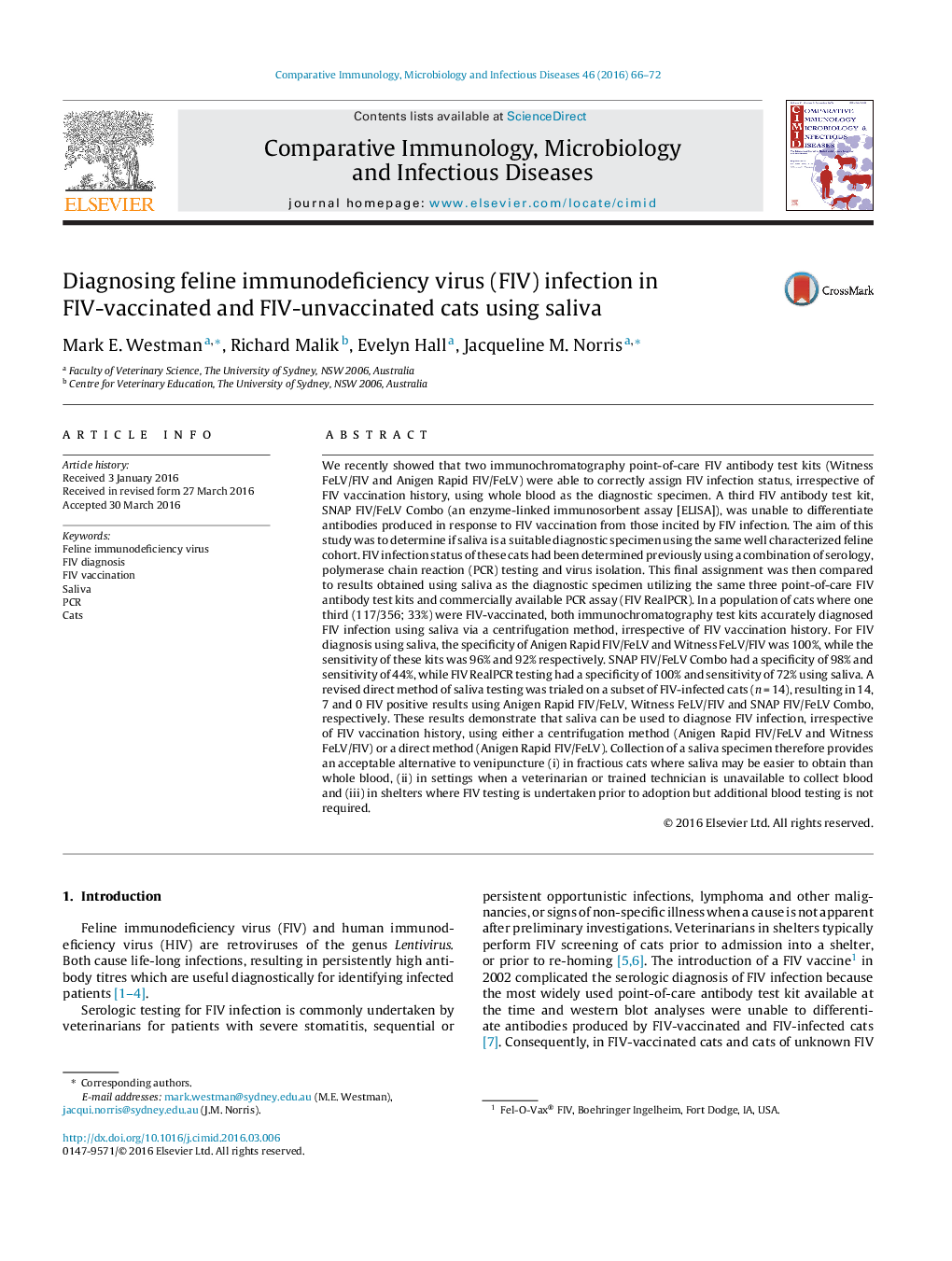| کد مقاله | کد نشریه | سال انتشار | مقاله انگلیسی | نسخه تمام متن |
|---|---|---|---|---|
| 2428164 | 1553519 | 2016 | 7 صفحه PDF | دانلود رایگان |

• Two commercially available point-of-care antibody test kits accurately diagnosed FIV infection in FIV-vaccinated cats using saliva as the diagnostic specimen, irrespective of FIV-vaccination history.
• A third antibody test kit had similar specificity but significantly reduced sensitivity compared to the other two antibody kits using saliva.
• These findings have the potential to change the way veterinarians diagnose FIV infection, particularly in shelters where large numbers of cats need to be screened for FIV infection quickly and affordably.
We recently showed that two immunochromatography point-of-care FIV antibody test kits (Witness FeLV/FIV and Anigen Rapid FIV/FeLV) were able to correctly assign FIV infection status, irrespective of FIV vaccination history, using whole blood as the diagnostic specimen. A third FIV antibody test kit, SNAP FIV/FeLV Combo (an enzyme-linked immunosorbent assay [ELISA]), was unable to differentiate antibodies produced in response to FIV vaccination from those incited by FIV infection. The aim of this study was to determine if saliva is a suitable diagnostic specimen using the same well characterized feline cohort. FIV infection status of these cats had been determined previously using a combination of serology, polymerase chain reaction (PCR) testing and virus isolation. This final assignment was then compared to results obtained using saliva as the diagnostic specimen utilizing the same three point-of-care FIV antibody test kits and commercially available PCR assay (FIV RealPCR). In a population of cats where one third (117/356; 33%) were FIV-vaccinated, both immunochromatography test kits accurately diagnosed FIV infection using saliva via a centrifugation method, irrespective of FIV vaccination history. For FIV diagnosis using saliva, the specificity of Anigen Rapid FIV/FeLV and Witness FeLV/FIV was 100%, while the sensitivity of these kits was 96% and 92% respectively. SNAP FIV/FeLV Combo had a specificity of 98% and sensitivity of 44%, while FIV RealPCR testing had a specificity of 100% and sensitivity of 72% using saliva. A revised direct method of saliva testing was trialed on a subset of FIV-infected cats (n = 14), resulting in 14, 7 and 0 FIV positive results using Anigen Rapid FIV/FeLV, Witness FeLV/FIV and SNAP FIV/FeLV Combo, respectively. These results demonstrate that saliva can be used to diagnose FIV infection, irrespective of FIV vaccination history, using either a centrifugation method (Anigen Rapid FIV/FeLV and Witness FeLV/FIV) or a direct method (Anigen Rapid FIV/FeLV). Collection of a saliva specimen therefore provides an acceptable alternative to venipuncture (i) in fractious cats where saliva may be easier to obtain than whole blood, (ii) in settings when a veterinarian or trained technician is unavailable to collect blood and (iii) in shelters where FIV testing is undertaken prior to adoption but additional blood testing is not required.
Journal: Comparative Immunology, Microbiology and Infectious Diseases - Volume 46, June 2016, Pages 66–72